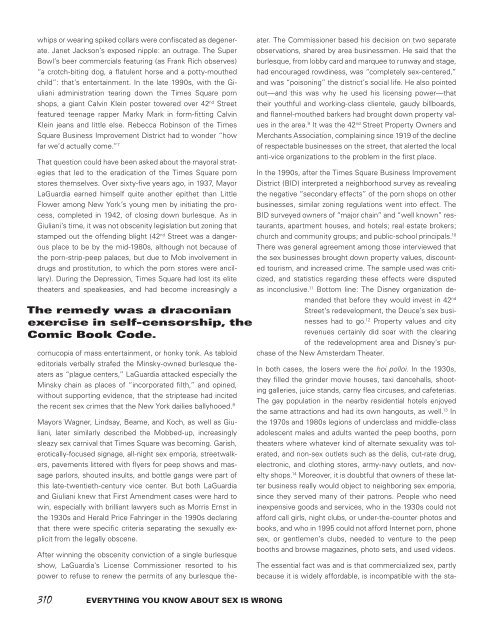Create successful ePaper yourself
Turn your PDF publications into a flip-book with our unique Google optimized e-Paper software.
whips or wearing spiked collars were confiscated as degenerate.<br />
Janet Jackson’s exposed nipple: an outrage. The Super<br />
Bowl’s beer commercials featuring (as Frank Rich observes)<br />
“a crotch‐biting dog, a flatulent horse and a potty‐mouthed<br />
child”: that’s entertainment. In the late 1990s, with the Giuliani<br />
administration tearing down the Times Square porn<br />
shops, a giant Calvin Klein poster towered over 42 nd Street<br />
featured teenage rapper Marky Mark in form‐fitting Calvin<br />
Klein jeans and little else. Rebecca Robinson of the Times<br />
Square Business Improvement District had to wonder “how<br />
far we’d actually come.” 7<br />
That question could have been asked about the mayoral strategies<br />
that led to the eradication of the Times Square porn<br />
stores themselves. Over sixty-five years ago, in 1937, Mayor<br />
LaGuardia earned himself quite another epithet than Little<br />
Flower among New York’s young men by initiating the process,<br />
completed in 1942, of closing down burlesque. As in<br />
Giuliani’s time, it was not obscenity legislation but zoning that<br />
stamped out the offending blight (42 nd Street was a dangerous<br />
place to be by the mid-1980s, although not because of<br />
the porn-strip-peep palaces, but due to Mob involvement in<br />
drugs and prostitution, to which the porn stores were ancillary).<br />
During the Depression, Times Square had lost its elite<br />
theaters and speakeasies, and had become increasingly a<br />
The remedy was a draconian<br />
exercise in self-censorship, the<br />
Comic Book Code.<br />
cornucopia of mass entertainment, or honky tonk. As tabloid<br />
editorials verbally strafed the Minsky-owned burlesque theaters<br />
as “plague centers,” LaGuardia attacked especially the<br />
Minsky chain as places of “incorporated filth,” and opined,<br />
without supporting evidence, that the striptease had incited<br />
the recent sex crimes that the New York dailies ballyhooed. 8<br />
Mayors Wagner, Lindsay, Beame, and Koch, as well as Giuliani,<br />
later similarly described the Mobbed-up, increasingly<br />
sleazy sex carnival that Times Square was becoming. Garish,<br />
erotically-focused signage, all-night sex emporia, streetwalkers,<br />
pavements littered with flyers for peep shows and massage<br />
parlors, shouted insults, and bottle gangs were part of<br />
this late-twentieth-century vice center. But both LaGuardia<br />
and Giuliani knew that First Amendment cases were hard to<br />
win, especially with brilliant lawyers such as Morris Ernst in<br />
the 1930s and Herald Price Fahringer in the 1990s declaring<br />
that there were specific criteria separating the sexually explicit<br />
from the legally obscene.<br />
After winning the obscenity conviction of a single burlesque<br />
show, LaGuardia’s License Commissioner resorted to his<br />
power to refuse to renew the permits of any burlesque theater.<br />
The Commissioner based his decision on two separate<br />
observations, shared by area businessmen. He said that the<br />
burlesque, from lobby card and marquee to runway and stage,<br />
had encouraged rowdiness, was “completely sex-centered,”<br />
and was “poisoning” the district’s social life. He also pointed<br />
out—and this was why he used his licensing power—that<br />
their youthful and working-class clientele, gaudy billboards,<br />
and flannel-mouthed barkers had brought down property values<br />
in the area. 9 It was the 42 nd Street Property Owners and<br />
Merchants Association, complaining since 1919 of the decline<br />
of respectable businesses on the street, that alerted the local<br />
anti-vice organizations to the problem in the first place.<br />
In the 1990s, after the Times Square Business Improvement<br />
District (BID) interpreted a neighborhood survey as revealing<br />
the negative “secondary effects” of the porn shops on other<br />
businesses, similar zoning regulations went into effect. The<br />
BID surveyed owners of “major chain” and “well known” restaurants,<br />
apartment houses, and hotels; real estate brokers;<br />
church and community groups; and public-school principals. 10<br />
There was general agreement among those interviewed that<br />
the sex businesses brought down property values, discounted<br />
tourism, and increased crime. The sample used was criticized,<br />
and statistics regarding these effects were disputed<br />
as inconclusive. 11 Bottom line: The Disney organization demanded<br />
that before they would invest in 42 nd<br />
Street’s redevelopment, the Deuce’s sex businesses<br />
had to go. 12 Property values and city<br />
revenues certainly did soar with the clearing<br />
of the redevelopment area and Disney’s purchase<br />
of the New Amsterdam Theater.<br />
In both cases, the losers were the hoi polloi. In the 1930s,<br />
they filled the grinder movie houses, taxi dancehalls, shooting<br />
galleries, juice stands, carny flea circuses, and cafeterias.<br />
The gay population in the nearby residential hotels enjoyed<br />
the same attractions and had its own hangouts, as well. 13 In<br />
the 1970s and 1980s legions of underclass and middle-class<br />
adolescent males and adults wanted the peep booths, porn<br />
theaters where whatever kind of alternate sexuality was tolerated,<br />
and non-sex outlets such as the delis, cut-rate drug,<br />
electronic, and clothing stores, army-navy outlets, and novelty<br />
shops. 14 Moreover, it is doubtful that owners of these latter<br />
business really would object to neighboring sex emporia,<br />
since they served many of their patrons. People who need<br />
inexpensive goods and services, who in the 1930s could not<br />
afford call girls, night clubs, or under-the-counter photos and<br />
books, and who in 1995 could not afford Internet porn, phone<br />
sex, or gentlemen’s clubs, needed to venture to the peep<br />
booths and browse magazines, photo sets, and used videos.<br />
The essential fact was and is that commercialized sex, partly<br />
because it is widely affordable, is incompatible with the sta-<br />
310 EVERYTHING YOU KNOW ABOUT SEX IS <strong>WRONG</strong>


